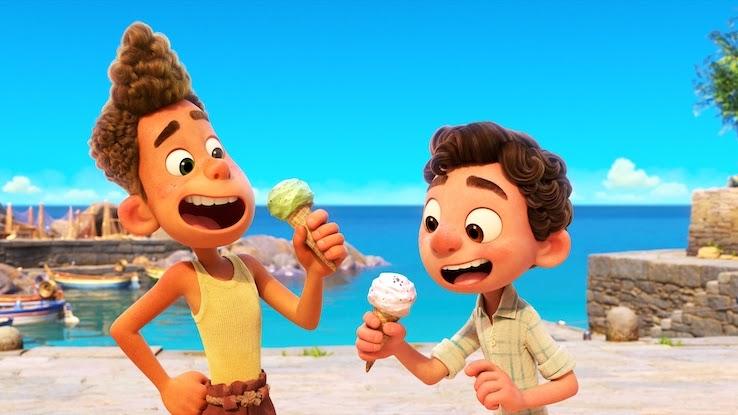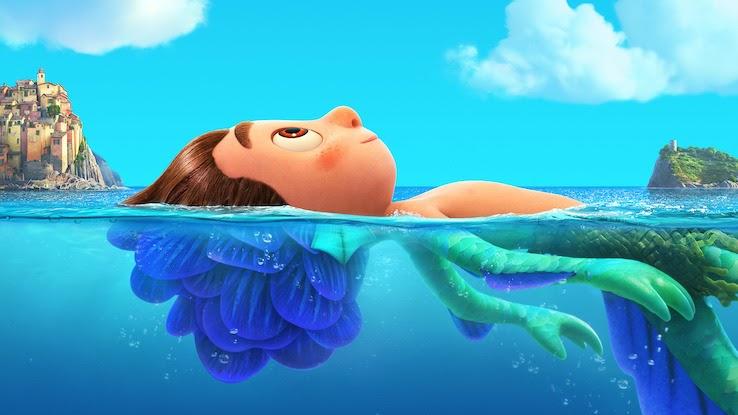
Rating: 6/10
I was initially disappointed by the setting of Luca. The latest animated film from Pixar, which opens on Disney+ this Friday, June 18, tells the story of the 13-year-old Luca (voiced by Jacob Tremblay). He finds a best friend in Alberto (voiced by Jack Dylan Grazer), and they spend a dreamy summer at Portorosso in the Italian Riviera. The thing is — and here’s where my discontent arose — Alberto and Luca are not regular teenagers but sea monsters who live underwater in a world hidden from humans.
Luca is a shepherd and herds his family’s goatfish but dreams of bigger things. Guided by Alberto, the two kids leave the seas and go to Portorosso in search of adventures and the Vespa that will make them possible — when dry, sea monsters transform into creatures indistinguishable from humans and definitely able to ride scooters. Let me add here that the transformation from sea monster to human comes with some Disney-suitable modesty garments made of seaweed. Also, Alberto lives by the motto that “everything good is above the surface” and believes that Vespas are “the greatest things humans ever made.”
The film, which is set during the summer months in the late 1950s and early 1960s, transports you to Italy from the opening credits set to “Un Bacio A Mezzanotte” by Quartetto Cetra. Other Italian pop songs are scattered throughout the movie, like “Il Gato E La Volpe” by Edoardo Bennato and “Viva La Pappa Col Pomodoro” by Rita Pavone.
The characters speak English with sort of an Italian accent, and here and there they say some well-known words in Italian — a little bit in the same way Coco did with English and Spanish. So you’ll hear “aspetta,” “silenzio,” “forchetta” and “piccoletto” and be able to understand their meanings in context.
The fictional town of Portorosso — and with it the whole Italian recreation of the movie — seems almost a bit too stereotypical sometimes. There’s a gelateria, kids play soccer in the town’s square, old men play cards, you can see laundry hanging on clotheslines, there are copious amounts of pasta being eaten and everyone moves their hands a lot when they talk. But as has been traditional in recent Pixar projects, the production team made a trip to Italy to research the “local culture, architecture and overall feeling of the film’s setting,” according to the film’s production notes. Luca was directed by Enrico Casarosa (La Luna), who grew up in the port city of Genoa.
I grew up in the Mediterranean city of Barcelona myself and have vivid memories of the summers I spent by the sea, having the same sunkissed cheeks and nose all the kids in this movie sport. That’s probably why the movie’s recreation of a whole anthropological underwater world puzzled me a little bit, especially when a story simply about a couple of friends in the Mediterranean for the summer could have been unbelievable and fantastical as-is. I didn’t see the need to add the supernatural element to something that already is dreamy and almost filled with magic.
Luca’s Supernatural Element

Luca is a coming-of-age story in which the protagonist learns the value of taking risks and getting out of his comfort zone — hence getting him out of the water and into the unknown in a world where he’s not exactly accepted or understood. Alberto and Luca have to hide their true identities because sea monsters aren’t necessarily well-loved in Portorosso.
“Sea monsters are a metaphor, really, for feeling different or excluded,” Casarosa explains in the film’s production notes. “I love the sense that all of our characters in some way feel different or unusual. Luca and Alberto so passionately want to be part of this other world — but they fear they won’t be accepted as they are. And yet, they love being sea monsters.”
“Some people, they’ll never accept him, but some will, and he seems to know how to find the good ones,” Luca’s grandmother (voiced by Sandy Martin) says, referring to the young one knowing how to make room for himself in the above-water world.
Other than its message of acceptance and openness, Luca packs the usual amount of physical comedy and humor. Alberto and Luca find a friend in the vivacious and brave Giulia (voiced by Emma Berman), who likes swearing by invoking cheeses. So there are a lot of “Santa Mozzarella!”, “Santo Pecorino!”, “Santa Ricotta!” and “Santa Gorgonzola!” Plus, it’s quite amusing to see the results after the first time the two teenage sea monsters have an espresso.
You’ll only be reminded about our current reality at the very end of the movie. Luca’s closing credits include a message explaining the film was dreamed up at Pixar Animation Studios but produced “in our slippers around the Bay Area.” In the same way and because of the COVID-19 pandemic, the movie was also unprecedented in the way they recorded the voices; all the actors performed their lines of dialogue from their homes.
The character of Alberto, whom Grazer voiced from inside his mother’s closet, is a carefree teenager who believes we should all silence that fear inside us that sometimes prevents us from taking chances. He calls his inner voice Bruno and advises shutting Bruno up often. His “Silenzio Bruno!” is probably one of the main takeaways from this movie that, while I had imagined it differently, made me long for a summer filled with sun, gelato, swims and friendship.






